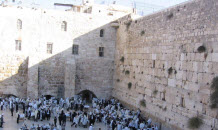Can we do תפילות prayers for:
AZAMRA?
So that through them The האור Light, The רפואה Healing and The אהבה Love of ישועת יהוה Yeshuath YHWH may come back to הארץ The Land of Israel?UNIVERSAL TORAH: KI TAVO
By Rabbi Avraham Greenbaum
Torah Reading: KI TAVO, Deuteronomy 26:1-29:8.
Haftara: Isaiah 60:1-22.
Our parshah, KI TAVO, puts the seal on Moses' detailed exposition of the commandments in the Mishneh Torah (=Deuteronomy) -- the "Second" or repeated Torah -- and recounts the Covenant that G-d struck with Israel in the plains of Moab prior to their entry into the Land. KI TAVO thus brings us into the closing sections of the Five Books of Moses, the very climax of the Torah. This is fitting reading as we approach the coming Day of Judgment -- Rosh Hashanah -- and the Days of Awe.
The commandments contained in our parshah are almost the last commandments written in the Torah -- except for the two commandments contained in next week's reading, the double parshah of NITZAVIM-VAYELECH. (Those relate to the teaching of the Torah -- its public reading at the HAKHEL assembly in the Temple following the Sabbatical year -- and to the accurate transmission of the Torah through writing a Torah scroll).


